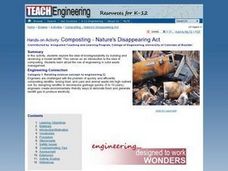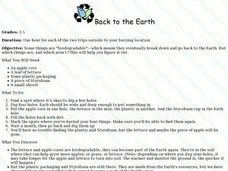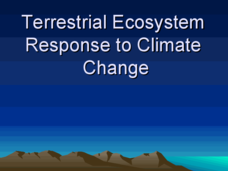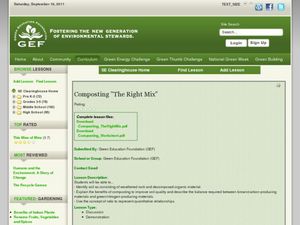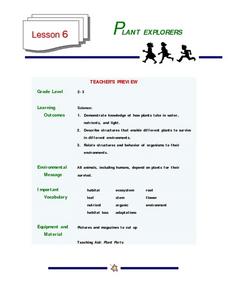Curated OER
The Rotten Truth
Learners study the process of decomposition using lunch leftovers and soil. They complete the inquiry over set periods time as they observe the how composting takes place and finally, they sort the materials into biodegradable,...
Curated OER
Autumn
Students examine the cycle of nutrients in a forest. They research the concepts of decomposing and recycling within a forest.
Curated OER
Composting -- Nature's Disappearing Act
Studenst work together to discover the concept of biodegradability. They build a model of a landfill and how different items decompose. They examine how engineers use this information for better waste management.
Curated OER
Making a Mini-Landfill
Students create a mini-version of a landfill. They examine the materials they use everyday and determine if they decompose or not. They identify the materials as renewable or nonrenewable as well.
Curated OER
A Design You’ll Dig: Designing a Habitat for Worms
Middle schoolers discover how worms contribute to the balance of the environment. In this composting lesson, students study the composting and decomposition processes. Middle schoolers then create habitats for worms that allow them to do...
Curated OER
Back to the Earth
Students conduct an experiment in which they bury four objects (apple, lettuce, plastic and styrofoam) in the ground and come back to observe them a month later. They consider what biodegrades and how it affects our planet.
Curated OER
Organic and Inorganic Waste
Students conduct a scientific investigation about organic or inorganic waste. In this organic or inorganic waste lesson, students create a compost heap to determine the difference between inorganic and organic waste. Students...
Curated OER
Terrestrial Ecosystem Response to Climate Change
An extensive investigation of the Earth's climate changes awaits your environmental science classes. This top-notch presentation begins by looking at the history of Earth's climate and then predicts the impact on each major terrestrial...
Curated OER
Discovering Local Food Chains
Fourth graders study about food chains. With the assistance of a local biologist, Students hike the school trail system. They explore ecosystem and collect data by charting the organisms found and identifying the energy source. They...
Captain Planet Foundation
Energy Flow in the Garden
How can you tell what an owl has eaten? Study the food chain and flow of energy in an ecosystem by dissecting an owl pellet and noting the bones found inside. Additionally, the lesson includes a game about consumers and producers with a...
Forest Foundation
The Nature of Trees
Young botanists examine the different parts of tress and then draw parallels between the functions of these parts and the function of parts of the human body.
National Park Service
Reduce Our Carbon Footprint, Let’s Compost!
Roll up your sleeves and get a little dirty with this elementary and middle school compost lesson. All you need is a large plastic container, a couple old newspapers, some organic waste, and a few hundred worms and you're ready...
Nuffield Foundation
Microbes Ate My Homework
Now you have a new excuse not to do your homework. A long-term experiment has learners explore cellulose-digesting enzymes. They simulate how paper breaks down in a compost bin. There's no need to blame your dog for eating your homework...
Desert Museum
Daisy Ecology
Here's a fine lesson that combines poetry with life sciences. Learners carefully listen to a poem that's all about a food chain. As the poem is read, learners name the producer, the herbivore, the carnivore, and the omnivore. Lots of...
Curated OER
Kingdom: Fungi
The general characteristics of fungus types are presented here. Your class will love the pictures of the amazing features found on these strange living things. The internal and external structures and their functions are highlighted. By...
Curated OER
Animals Must Fit In
A instructional activity on tadpoles is here for your young biologists. Learners read a short paragraph on tadpoles, then answer three questions regarding how parts of their bodies help the tadpole to survive in the pond. There is a good...
Curated OER
Kingdom: Fungi
The general characteristics that affect classification of fungi and other organisms in the domain Eukarya are detailed for the students on 12 attractive slides. Teachers can access individual slides to cover life cycles or...
Curated OER
Dinnertime for Animals
Is a deer an herbivore? What about a spider? Experiment with the food chain in an interactive science experiment. After listing the herbivores from a selection of animals, third and fourth graders compare the skulls and teeth of...
Alabama Learning Exchange
Good Litter, Bad Litter
Which ones can be thrown on the ground? Discover the difference between natural litter and unhealthy trash, helping scholars by using several examples. Use the information here to give them a basic background, but also encourage prior...
Curated OER
Composting "The Right Mix"
Students investigate the correct mix of material types for compost. In this composting lesson, students explore the correct amounts of different types of materials to create a compost heap. Students then create a compost heap.
Curated OER
Plant Explorers
Students investigate how plants take in water, nutrients, and light. They create artwork showing how plants survive in different environments.
Curated OER
Where Does Your Garbage Go?
The objective of this lesson is to teach students about the importance of recycling. Initially, students have a chance to think about their impact on our planet by following the path that garbage takes. Students then learn about how...
Curated OER
Red Wigglers
Students are introduced to the benefits of using Red Wiggler worms to produce compost. They identify the requirements for the worms and the methods to follow in order to produce compost. They draw a picture of a functioning worm bin.
Curated OER
The Human Impact on the Environment
Despite the typos and formatting issues, the Word document found here has some great potential. There are two questions that ask learners to put several events in a logical order; these could easily be made into a card sort activity....
Other popular searches
- 4 Soil Decomposers
- Types of Soil Decomposers
- Four Soil Decomposers
- Ten Soil Decomposers
- "4 Soil Decomposers
- Exambles of Soil Decomposers
- \"4 Soil Decomposers




